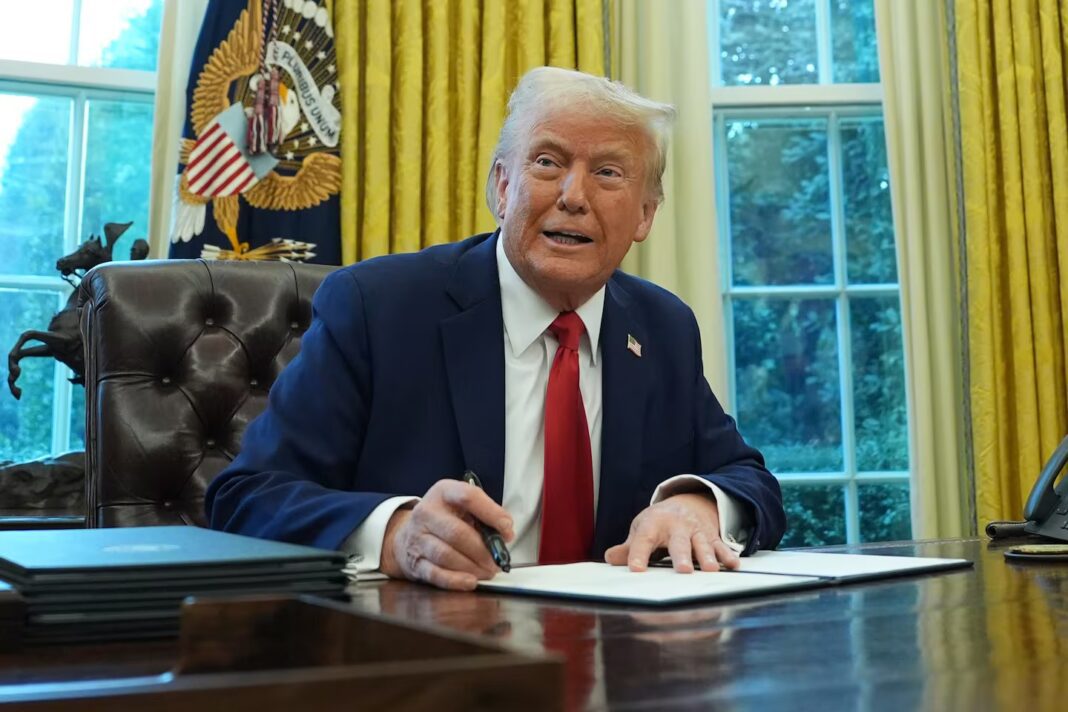Temporary Relief from a Potential Trade War
President Donald Trump has agreed to pause his planned tariffs on Mexico and Canada for 30 days. The decision comes as both nations take steps to address his concerns about border security and drug trafficking. This temporary relief cools tensions after days of uncertainty that had the potential to trigger a full-blown trade war.
The pause provides negotiators time to work on an economic deal that could prevent severe disruptions to North America’s trade relationships. Trump described the development as a positive step, expressing hope that a final agreement could be reached.
What Led to the Tariff Threats?
Trump had announced a 25% tariff on imports from Mexico and Canada, along with an additional 10% tax on Canadian oil, natural gas, and electricity. His administration justified the move as necessary to combat illegal immigration and fentanyl smuggling.
Many experts warned that these tariffs would have devastating effects on economic growth, raising prices and straining relations with America’s closest allies. Financial analysts had predicted rising inflation, supply chain disruptions, and major losses for businesses and consumers.
Mexico and Canada Take Action
Both Mexico and Canada scrambled to respond to Trump’s demands. Mexican President Claudia Sheinbaum announced that her government would deploy 10,000 National Guard troops to reinforce the border. In return, the U.S. agreed to work on stopping the flow of high-powered weapons into Mexico.
Meanwhile, Canadian Prime Minister Justin Trudeau promised to take stronger action against organized crime. He pledged to appoint a “fentanyl czar” and designate Mexican cartels as terrorist organizations. Additionally, Canada will launch a joint strike force with the U.S. to combat drug trafficking and money laundering.
Uncertainty Over Long-Term Outcome
Despite the pause, uncertainty remains. The 10% tariff on Chinese imports is still set to take effect as planned. Trump is also preparing to announce new tariffs against the European Union, which could further complicate global trade.
While Mexico and Canada have bought themselves more time, Trump’s unpredictability means that the tariff threats could return at any moment. The upcoming negotiations will determine whether North America can avoid a costly economic showdown.
Businesses and Markets React
The business community and financial markets remain on edge. Companies have been scrambling to prepare for the potential impact of tariffs. Some businesses have considered stockpiling goods, while others are looking for alternative suppliers outside North America.
For example, supermarket chains have explored switching from Canadian salmon to Norwegian alternatives. Importers of Mexican tequila have looked into securing additional stock before any tariffs take effect.
Stock markets reacted with slight losses, signaling investors’ mixed feelings about whether the pause would lead to a long-term resolution. Trump himself seemed interested in the market’s response, asking reporters how financial markets were doing as he left the Oval Office.
Trump’s Views on Tariffs
Trump has long been a vocal supporter of tariffs, often calling them a powerful economic tool. He has suggested that the U.S. should rely more on tariffs instead of income taxes. Despite concerns about inflation, he believes tariffs give the U.S. leverage in trade negotiations.
On Monday, he defended his tariff threats, arguing that they force other countries to make concessions. “Tariffs are very powerful both economically and in getting everything else you want,” he told reporters. “Nobody can compete with us because we’re the pot of gold.”
Concerns from Everyday People
While politicians and business leaders debate the impact of tariffs, everyday people remain uncertain about how this will affect them. Jaime Bricker, a tourism official from Skagway, Alaska, said Canadian visitors are crucial to her community’s economy. Many Canadians she spoke to recently worried that tariffs could make travel to the U.S. too expensive.
The Road Ahead
The next 30 days will be critical in determining whether the U.S., Mexico, and Canada can reach a final trade agreement. If negotiations fail, Trump may decide to reinstate the tariffs, potentially leading to economic turmoil.
The world will be watching closely as the three nations navigate this delicate situation. For now, businesses and consumers can breathe a little easier, but the long-term future remains uncertain.

